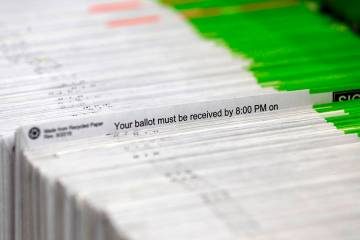EDITORIAL: Nevada Supreme Court sides with transparency
The intransigence of public agencies when it comes to records requests has very real costs for Clark County taxpayers, both figuratively and literally.
Last week, the Review-Journal prevailed in two court cases involving government transparency. The first case involved the Clark County coroner’s office, which had refused to release certain autopsy reports. The second involved the Clark County School District’s efforts to suppress documents pertaining to a former School Board trustee.
In both instances, the refusal of local officials to follow state law led to the waste of thousands of taxpayer dollars and, in at least one instance, thousands more in penalties. But the cases also highlight how too many bureaucracies cavalierly use taxpayer money to keep those very same taxpayers in the dark about their activities.
At the behest of Coroner John Fudenberg, the Clark County Commission funded an effort to fight the release of autopsy reports that the Review-Journal had requested in 2017 involving the deaths of foster children. Such reports can be vital to answering questions about potential criminal activity, misconduct and malfeasance. Mr. Fudenberg, however, cited privacy concerns and insisted that the information was not covered under the state’s public records statutes, even though it is not specifically exempted from the law.
In September 2017, a District Court judge ruled against the county, saying he “found the legal arguments insufficient to justify withholding the information.” But commissioners voted to plow forward with an appeal funded by other people’s money.
On Thursday, the Nevada Supreme Court ruled unanimously that autopsy reports are indeed public documents. The justices noted that not only are the records not exempt from disclosure under state statute but lawmakers had specifically determined it was in the public’s best interest to “provide as much disclosure as possible with regard to children who suffer fatalities or near fatalities while in the care of the child welfare system.”
The justices did hold that the coroner may redact certain private medical or health information from the reports. It remains to be seen whether the office tries to exploit that loophole. But the principle is now established that autopsy reports must be available to the public in Nevada. “This is important because coroners are pubic officials,” Review-Journal attorney Maggie McLetchie said, “and their offices work for the public and hold information that is important to the public.”
Unfortunately, Clark County taxpayers were forced to cover the $80,000 cost of the legal fight — and the tab could go higher if the paper is eventually awarded legal fees.
In the second case, the Supreme Court on Thursday ruled that the Review-Journal is entitled to recover $125,000 in legal expenses accrued while trying to force the school district to turn over records regarding former Trustee Kevin Childs. Once again, the district spent taxpayer money to avoid releasing the information but lost in court. District officials then threw good money after bad when they appealed a lower court ruling regarding the fees by arguing that the district was immune to paying damages.
The state high court wisely rejected that contention.
Last year, Nevada lawmakers strengthened the state’s public records law by adding penalties for agencies that willfully violate the statute by denying or delaying requests for documents. Government lobbyists — paid by taxpayers to work against the interest of taxpayers — vigorously opposed the reform. Thursday’s Supreme Court rulings indicate there’s still much work to be done to ensure that Nevada’s public agencies recognize the importance of conducting business in an open and transparent manner. Democracy depends upon it.





























